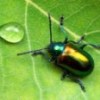While in Florida earlier this year I turned over a leaf to find this gruesome scene:

A worker of the Florida Carpenter Ant (Camponotus floridanus) stationed along a leaf vein among a herd of scale insects. Except, without a head.
I honestly don't know what happened to the poor ant. Any ideas?

I have seen a number of Pogos wandering around this summer -sans heads. Culprit? Not confirmed but almost certainly other ants.
Phorid flies?
I have no idea what happened to her head, but the discoloration on the leaf certainly adds to the disturbingness factor - it gives the illusion of a pool of blood gushing onto the ground after she was decapitated.
I believe I read somewhere that Hannibal Lecter was last seen in a tropical clime. Or maybe that was in a movie...
Thanks to Tim for pointing out the same disturbing illusion I saw while looking at that photo.
It's taking the day off.
At first glance and before reading your description, I thought this was going to be about a spider mimic of C. floridanus. But the truth is, in the words of Jane Goodall, simply horrifying! The illusion created by the leaf mine - ach! - I can hardly stand to look at it.
I thought it was a spider mimcing a worker ant!
Yeah, I thought it was a spider too when I first pointed my lens at it.
Hiding its head to look more like a spider, eh? Hmmm.
Tom Eisner observed millipedes of the species Narceus gordanus were also found decapitated at Archbold Field Station. In the millipedes' case, they were found without not only their heads but also their first four segments. (FYI: Narceus gordanus millipedes have defense glands on segments posterior to the fourth.) He predicts that it's a smart vertebrate (and not a phengodid) who's circumventing the defenses of the millipede by simply biting off the tasty end! He names the mystery, "Robespierre."
http://antfarm.yuku.com/topic/8971 for caption and doctoring. ;)